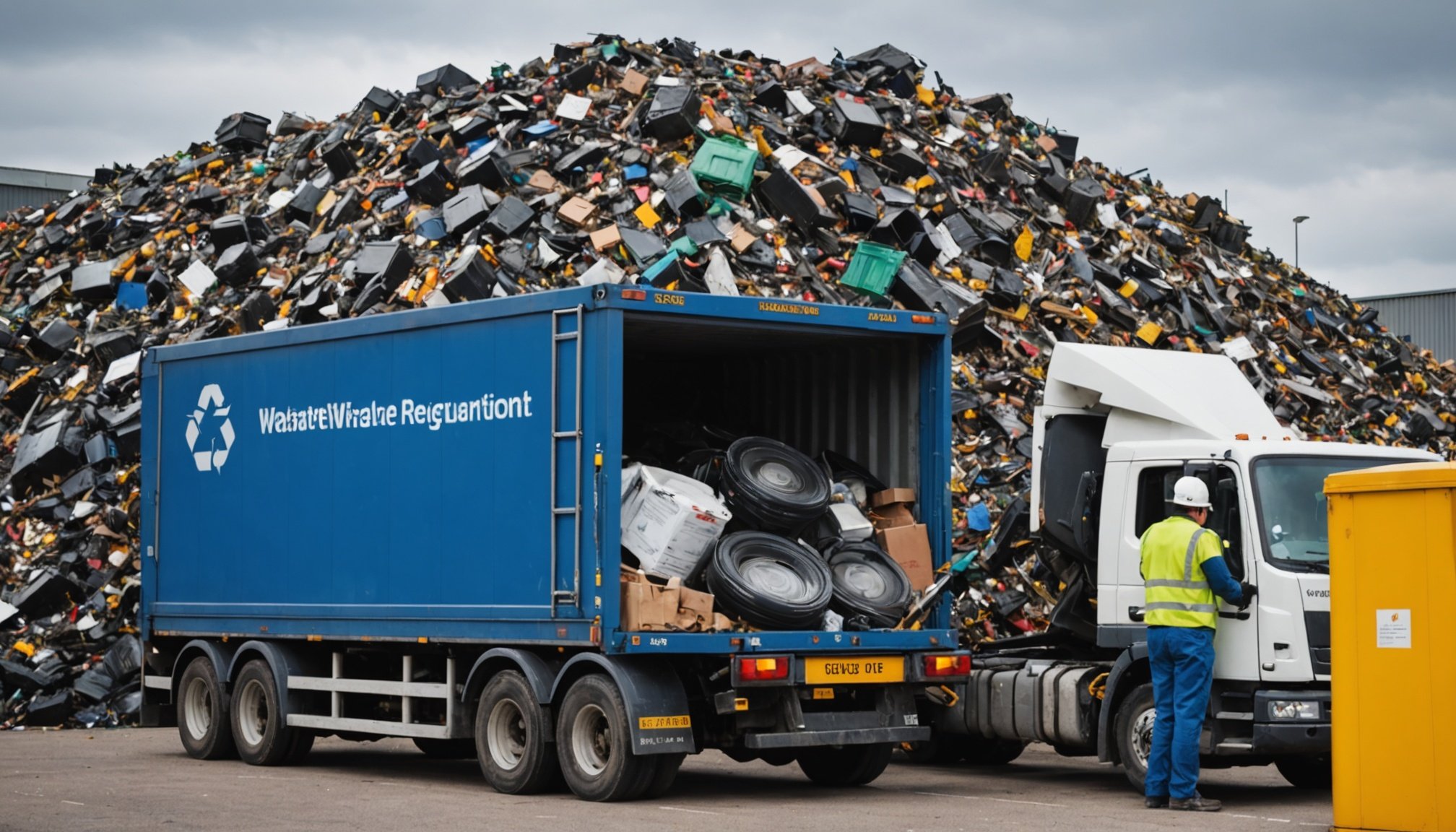Navigating UK Business Responsibilities Under the 2011 Waste Regulations: A Comprehensive Guide
Understanding the 2011 Waste Regulations
The Waste (England and Wales) Regulations 2011 are a cornerstone of environmental policy in the UK, setting clear guidelines for businesses involved in waste production, transportation, and disposal. These regulations are designed to ensure that waste is managed in a way that prioritizes environmental protection and sustainability.
The Waste Hierarchy
At the heart of these regulations is the waste hierarchy, a framework that dictates the order in which waste management options should be considered. This hierarchy is as follows:
Have you seen this : Mastering Compliance: Key Legal Duties for UK Businesses Under the Modern Slavery Act 2015
- Prevention: Reducing the amount of waste generated in the first place.
- Preparing for re-use: Ensuring that items can be reused rather than discarded.
- Recycling: Breaking down waste into raw materials that can be used to make new products.
- Other recovery: Using waste to generate energy or for other forms of recovery.
- Disposal: The last resort, involving the safe and regulated disposal of waste[1][3].
Legal Requirements
Businesses in England and Wales must adhere to these regulations, which apply to all aspects of waste management, including production, transportation, storage, and disposal. The regulations are a successor to the Hazardous Waste (England and Wales) Regulations 2005 and build upon the principles set out in the Waste Framework Directive.
Under these regulations, businesses are required to notify the Environment Agency if they produce more than 500kg of waste. They must also provide quarterly information on waste recovery and disposal processes, including details on the quantity and chemical composition of the waste[1].
In the same genre : Exploring UK Business Duties Under the Financial Services and Markets Act 2000: Comprehensive Legal Guide
Managing Hazardous Waste
Hazardous waste poses a significant risk to the environment and public health, and its management is subject to stringent regulations.
Definition and Examples
Hazardous waste includes materials that are toxic, corrosive, flammable, or reactive. Examples include chemicals, pesticides, batteries, and certain types of industrial waste. These substances require special handling and disposal to prevent environmental contamination and health hazards.
Compliance and Best Practices
Businesses dealing with hazardous waste must work closely with authorized disposal sites and follow strict guidelines. Here are some best practices:
- Proper Labeling and Storage: Ensure that hazardous waste is labeled correctly and stored in designated areas to prevent accidents and contamination.
- Transportation: Use licensed transporters to move hazardous waste to treatment and disposal facilities.
- Documentation: Maintain detailed records of waste production, transportation, and disposal to comply with regulatory requirements[1][2].
Construction and Industrial Waste Management
Construction and industrial activities generate significant amounts of waste, which must be managed in accordance with the 2011 regulations.
Construction Waste
Construction sites are required to maintain high standards of housekeeping to comply with legal obligations and promote environmental sustainability. Here are some key considerations:
- Waste Minimization: Implement strategies to reduce waste generation during construction projects.
- Reuse and Recycling: Prioritize the reuse and recycling of materials such as wood, metal, and concrete.
- Proper Disposal: Ensure that all waste is disposed of in accordance with the waste hierarchy, using licensed waste management services[3].
Industrial Waste
Industrial cleaning and waste management are critical for maintaining environmental compliance and operational efficiency. Here are some services that businesses might require:
- Tank Cleaning: Regular cleaning of tanks to prevent contamination and ensure safe storage.
- Bund Cleaning: Cleaning of bunds to prevent oil and chemical spills.
- Specialist Cleaning: Cleaning services for specific industrial needs, such as chemical repackaging and interceptor emptying.
- Emergency Spillage/Waste Removal: Immediate response to spills and waste emergencies to minimize environmental impact[2].
Food Waste and Packaging Waste
Food waste and packaging waste are significant contributors to the overall waste stream in the UK.
Food Waste
Food waste is a major issue, with significant environmental and economic impacts. Here are some strategies for reducing food waste:
- Prevention: Implement measures to reduce food waste at the source, such as better inventory management and reduced portion sizes.
- Composting: Use food waste for composting to produce nutrient-rich soil.
- Anaerobic Digestion: Use anaerobic digestion to generate energy from food waste[5].
Packaging Waste
Packaging waste, particularly from single-use carrier bags, has been a focus of recent regulatory changes.
- Single Use Carrier Bag Charge: Since 2015, retailers with more than 250 employees have been required to charge for single-use carrier bags. This charge has been extended to all retailers since April 2021 to reduce plastic waste[5].
- Biodegradable Bags: There is ongoing work to develop biodegradable bags that meet environmental standards, which could potentially be exempt from the charge.
Compliance and Duty of Care
Compliance with the 2011 Waste Regulations is not just a legal requirement but also a moral and environmental duty.
Duty of Care
The duty of care principle requires businesses to ensure that their waste is managed responsibly throughout its entire lifecycle. This includes:
- Proper Waste Classification: Correctly classify waste to ensure it is handled and disposed of appropriately.
- Licensed Waste Carriers: Use licensed waste carriers to transport waste.
- Documentation: Maintain accurate records of waste transfer notes and other relevant documentation[1].
Environmental Protection Act
The Environmental Protection Act 1990 provides the legal framework for waste management in the UK. It emphasizes the importance of protecting the environment and public health through proper waste management practices.
Practical Insights and Actionable Advice
Navigating the complexities of waste regulations can be challenging, but here are some practical insights and actionable advice to help businesses comply:
Conduct Regular Audits
Regular audits can help identify areas for improvement in your waste management practices. This includes assessing waste generation, storage, and disposal processes.
Train Your Staff
Ensure that all staff members are trained on the importance of proper waste management and the legal requirements they must adhere to.
Collaborate with Experts
Working with specialized waste management companies can provide valuable expertise and ensure compliance with all regulatory requirements.
Managing waste in accordance with the 2011 Waste Regulations is a critical responsibility for businesses in England and Wales. By understanding the waste hierarchy, managing hazardous waste effectively, and ensuring compliance with all legal requirements, businesses can contribute to a more sustainable and environmentally protected future.
Key Takeaways
- Waste Hierarchy: Prioritize prevention, reuse, recycling, recovery, and disposal in that order.
- Hazardous Waste: Handle and dispose of hazardous waste with special care to prevent environmental and health risks.
- Construction and Industrial Waste: Implement strategies to minimize, reuse, and recycle waste in construction and industrial settings.
- Food and Packaging Waste: Reduce food waste through prevention and composting, and comply with regulations on packaging waste.
- Compliance and Duty of Care: Ensure all waste is managed responsibly and in compliance with legal requirements.
By following these guidelines and best practices, businesses can not only comply with the law but also contribute to a cleaner, healthier environment for everyone.
Detailed Table: Comparison of Waste Management Options
| Waste Management Option | Description | Environmental Impact | Cost |
|---|---|---|---|
| Prevention | Reducing waste generation at the source | High environmental benefit | Low |
| Reuse | Using items again instead of discarding them | Medium environmental benefit | Low |
| Recycling | Breaking down waste into raw materials | High environmental benefit | Medium |
| Energy Recovery | Using waste to generate energy | Medium environmental benefit | High |
| Disposal | Safe and regulated disposal of waste | Low environmental benefit | High |
Detailed Bullet Point List: Steps for Ensuring Compliance with the 2011 Waste Regulations
- Identify and Classify Waste: Correctly classify your waste to ensure it is handled and disposed of appropriately.
- Use Licensed Waste Carriers: Ensure that all waste is transported by licensed carriers.
- Maintain Accurate Records: Keep detailed records of waste transfer notes and other relevant documentation.
- Implement the Waste Hierarchy: Prioritize prevention, reuse, recycling, recovery, and disposal in that order.
- Train Staff: Ensure all staff members are trained on the importance of proper waste management and the legal requirements they must adhere to.
- Conduct Regular Audits: Regularly audit your waste management practices to identify areas for improvement.
- Collaborate with Experts: Work with specialized waste management companies to ensure compliance with all regulatory requirements.
- Ensure Proper Storage and Disposal: Ensure that all waste is stored and disposed of in accordance with the regulations to prevent environmental contamination and health risks.
Relevant Quotes
- “The Waste (England and Wales) Regulations 2011 set the requirements for businesses and stores to transport, collect, recover, and dispose of waste. Under this regulation, waste management options must include prevention, reuse, recycling, recovery, and disposal as considered a waste hierarchy.”[1]
- “Any construction project needs to have a good standard of ‘housekeeping’ to comply with legal requirements and promote environmental sustainability and operational efficiency.”[3]
- “The duty of care principle requires businesses to ensure that their waste is managed responsibly throughout its entire lifecycle.”[1]
By following these guidelines, businesses can ensure they are not only complying with the law but also contributing to a more sustainable future for everyone.











